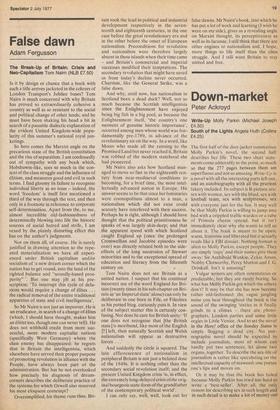False dawn .
Adam Fergusson
hit by design or chance that a book with such a title arrives jacketed in the colours of London Transport's Jubilee buses? Tom Nairn is much concerned with why Britain has proved so extraordinarily cohesive a country as well as so resistant to the social and political change of other lands; and he must have been shaking his head a bit in search of a passable dialectic explanation of the evident United Kingdom-wide popu- larity of this summer's national royal jun- ketings.
So here comes the Marxist angle on the precarious state of the British constitution and the rise of separatism. I am confessedly out of sympathy with any book which, Hobsbawm-like, sees so much in the con- text of the class struggle and the influence of elitism, and measures good and evil in such terms. I find gloomy its failure to recognise individual liberty as an issue - indeed, the word 'freedom' is itself first mentioned a third of the way through the text, and then only in a footnote in reference to corporate self-determination. Apart from the, to me, almost incredible old-fashionedness of determinedly blowing into life the historic sources of social hatred and strife, I am vexed by the plainly distorting effect this has on the author's judgments.
Not on them all, of course. He is surely justified in drawing attention to the repe- ated materialisation we have all experi- enced under British capitalism and/or socialism of 'a new dream corner which the nation has to get round, into the land of the righted balance and "soundly-based pros-
perity" But one may jib at his pre- scription: 'To interrupt this cycle of delu- sions would require a change of elites . • the radical removal of the entire traditional apparatus of state and civil intelligentsia'.
So Mr Nairn is not just an improver. He is an eradicator, in search of a change of elites (which, I should have thought, makes him an elitist too, though one can never tell). He does not withhold credit from more suc- cessful, more modern capitalist nations (specifically West Germany) where the class enemy has disappeared: he regrets that in Britain the intelligentsia, which elsewhere have served their proper purpose of promoting revolution in 'alliance with the People, have always been part of the administration. But has he not overlooked how precisely his diagnosis of dream- corners describes the deliberate practice of the systems for which Orwell also reserved his most eloquent contempt?
Oversimplified, his theme runs thus, Bri-
tain took the lead in political and industrial development respectively in the seven- teenth and eighteenth centuries, in the one case before the great revolutionary era and in the other before the onset of European nationalism. Preconditions for revolution and nationalism were therefore largely absent in these islands when their time came - and Britain's commercial and imperial successes modified their temptations. The secondary revolution that might have saved us from today's decline never occurred. Chartism, like the General Strike, was a false dawn.
And why, until now, has nationalism in Scotland been a dead duck? Well, not so much because the Scottish intelligentsia since the Enlightenment have enjoyed being big fish in a big pool, as because the Enlightenment itself, 'the country's one moment of genuine historic importance', occurred among men whose world was fun- damentally pre-1789, in advance of the revolutionary air on the way. In a word, like Moses who made all the running to the Promised Land but never reached it, Britain was robbed of the modern statehood she had pioneered.
Mr Nairn also asks how Scotland man- aged to move so fast in the eighteenth cen- tury from near-mediaeval conditions to becoming, for a brief time, the most intel- lectually advanced nation in Europe. His answer seems to be that since her luminaries were cosmopolitans almost to a man, a nationalism which did not exist could scarcely have interfered with their success. Perhaps he is right, although I should have thought that the political primitiveness he speaks of was largely skin-deep; and that the apparent speed with which Scotland caught England up (once' the prolonged Cromwellian and Jacobite episodes were over) was directly related both to the side- effects of the long succession of Stewart minorities and to the exceptional spread of education and literacy from the fifteenth century on.
Tom Nairn does not see Britain as a united nation. I suspect that his continual incorrect use of the word England for Bri- tain (twenty times in his sub-chapter on Bri- tain as 'an Imperial state' alone) can only be deliberate in one born in Fife, or Fifeshire as his potted biog. curiously puts it. In view of the subject matter this is certainly con- fusing. Nor does he care for British unity: 'If one does not recognise that (the British state] is moribund, like most of the English [?] left, then naturally Scottish and Welsh nationalism will appear as destructive forces .
And suddenly the circle is squared. The late efflorescence of nationalism in peripheral Britain is not just a belated dose of the 1848s. It is nothing other than the secondary social revolution itself; and the present United Kingdom crisis 'is, in effect, the extremely long-delayed crisis of the orig- inal bourgeois state-form of the grandfather of the contemporary political world'.
I can only say, well, well, look out for false dawns. Mr Nairn's book, into which he has put a lot of work and learning (I wish he were on my side), gives us a revealing angle on Marxist thought, its perceptiveness as well as its lacunae. I still think that there are other engines to nationalism and, I hope, more things to life itself than the class struggle. And I still want Britain to stay • united and free.


































 Previous page
Previous page